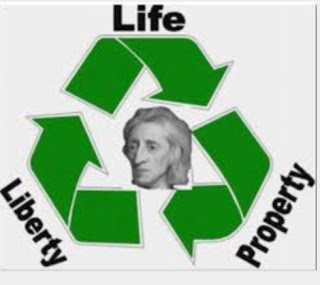(This image from https://twitter.com/johnlockeingood/status/667959259594801152)
The unalienable rights of man and the govt's protection of life, liberty and property
By Jeremiah Belgica, April 24, 2022
https://www.manilatimes.net/2022/04/24/opinion/columns/the-unalienable-rights-of-man-and-the-govts-protection-of-life-liberty-and-property/1841045#
ARTICLE 3 of the Philippine Constitution contains our Bill of Rights. This is perhaps the most important list that contains one's protection against any governmental abuses. The very first part of Section 1 states, "No person shall be deprived of life, liberty or property without due process of law..." This portion merely echoes what all free nations refer to as Man's Unalienable Rights. These rights are neither granted nor could be taken away by any government or institutions, simply because it is considered to be sacred and divinely given. In fact, the protection of the unalienable rights to life, liberty and property is one of the most compelling reasons and bases for the creation of a civil government. This connection between the protection of the unalienable rights and the creation of government by the people is eloquently stated by Thomas Jefferson in the US Declaration of Independence, to quote:
"We hold these truths to be self-evident, that all men are created equal, that they are endowed by their Creator with certain unalienable Rights, that among these are Life, Liberty and the pursuit of Happiness — That to secure these rights, Governments are instituted among Men, deriving their just powers from the consent of the governed."
What happens, however, when the very institution that was created to protect the unalienable rights of the people becomes the very institution that threatens and encumbers them? The result would be catastrophic and tragic. World history is never lacking with examples that show oppression by government or its institutions of the people's rights to life, liberty and property, which led to their revolting against the powers-that-be. Great examples of which are the American Revolution, French Revolution and our very own Philippine Revolution, to mention a few.
But there is a more subtle way that these unalienable rights could be abused by government instrumentalities. This is through red tape or excessive bureaucratic regulations and processes. Red tape is defined by Republic Act (RA) 11032 or the "Ease of Doing Business and Efficient Government Service Delivery Act of 2018" as "any regulation, rule or administrative procedure or system that is ineffective or detrimental in achieving its intended objectives and, as a result, produces slow, sub-optimal and undesirable social outcomes."
In the end, red tape breeds more opportunity for fixing and corruption to fester within the bureaucratic system leading to more bureaucratic problems. This could result in deprivation of the people from the productive use of their time (life and liberty) and resources (property).
This is the reason why we in the Anti-Red Tape Authority continue to push for reforms within government agencies and institutions that would capacitate them to appraise proposed and existing regulations and processes as to whether they are causing unnecessary bureaucratic burden to the people...
The true statesman and government streamlining
By Jeremiah Belgica, May 1, 2022
https://www.manilatimes.net/2022/05/01/opinion/columns/the-true-statesman-and-government-streamlining/1841906
BRITISH economist and philosopher Edmund Burke once said, "The great difference between the real statesman and the pretender is, that the one sees into the future, while the other regards only the present; the one lives by the day, and acts on expedience; the other acts on enduring principles and for immortality."
It is important that in order for any society to survive in constantly changing times is to have timeless principles as its bedrock and foundation. An example of which is the concept of a statesman. A statesman is no ordinary governmental leader but is a kind of public servant leader who is wise, skillful and well experienced in handling public matters and concerns. He is also one who people normally believe to be of good character and is of well repute. Thus, every generation needs to have their own statesmen serving them in different capacities in various public institutions for it to develop and enrich everything that it inherited from the past and lead the way as it passes its gains to the succeeding generations....
See also: Belgica papers 1, The responsibility of life, liberty and property, March 04, 2023.

No comments:
Post a Comment